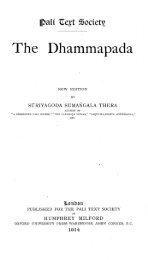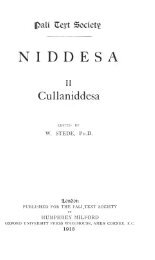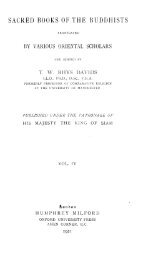Lessons In Practical Buddhism - Sirimangalo.Org
Lessons In Practical Buddhism - Sirimangalo.Org
Lessons In Practical Buddhism - Sirimangalo.Org
You also want an ePaper? Increase the reach of your titles
YUMPU automatically turns print PDFs into web optimized ePapers that Google loves.
Disease is an inevitable part of life. No one can finish their<br />
life without succumbing to deadly sickness of some sort,<br />
unless they die by some more unnatural means.<br />
Recognizing sickness as a fact of life, we should be careful<br />
not to become dependent on medicines as a means of curing<br />
all of our suffering. <strong>In</strong> the end, medicine alone will not be<br />
enough to achieve that goal.<br />
The Buddha taught four kinds of suffering: dukkha-vedanā,<br />
dukkha-sabhāva, dukkha-lakkhaṇa, and dukkha-sacca.<br />
Dukkha-vedanā is suffering as a feeling. This is how most<br />
people understand suffering, and so they think that by<br />
simply avoiding painful, unpleasant feelings they can be free<br />
from suffering. Such people tend to live in great fear of<br />
sickness and are quick to seek out medicine, medication and<br />
even drugs to solve all of their physical ailments.<br />
Dukkha-sabhāva means suffering as an existential reality. It<br />
means suffering is a part of life, something that cannot be<br />
avoided. Old age and death cannot be avoided; hunger,<br />
thirst, the need to urinate and defecate likewise cannot be<br />
avoided by anyone. A person who realizes this will tend to<br />
shy away from medicine as a cure to suffering and try<br />
instead to find a more comprehensive solution. This sort of<br />
person is naturally inclined towards meditation.<br />
Dukkha-lakkhaṇa means suffering as an inherent<br />
characteristic of all arisen phenomena. Even pleasant<br />
experiences are unstable, uncertain, and therefore<br />
unsatisfying. Knowledge of this sort is true wisdom that can<br />
only come from meditation practice; it is outside of the realm<br />
of non-meditative understanding.<br />
When a person tries to meditate for the first time, they will<br />
generally make an attempt to force their meditation to<br />
become stable, satisfying, and controllable. As they<br />
progress, however, they will come to see that nothing they<br />
experience is any of these things. They may even give up<br />
meditation entirely, thinking that it is the meditation itself<br />
that is responsible for the unsatisfactory state of affairs,<br />
instead of accepting the truth that all experience is<br />
impermanent, unsatisfying, and uncontrollable. Actually, it is<br />
not difficult to understand intellectually how nothing lasts for<br />
more than an instant, is therefore unable to satisfy, and thus<br />
42












